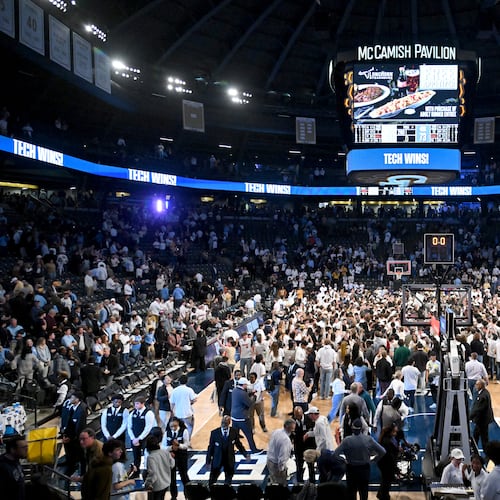At Grant Field, where fans wore masks to football games 102 years ago in the midst of the Spanish flu pandemic, history is on track to repeat itself.
Georgia Tech announced plans Wednesday to permit fans at home games this fall, capping attendance at 20% of capacity in 55,000-seat Bobby Dodd Stadium, a measure taken to limit the risk of spreading COVID-19.
Masks will be mandatory within the stadium, and fans will be issued tickets in socially-distanced clusters. For many Yellow Jackets fans desperate for a taste of their pre-pandemic lives and to satisfy their passion for college football, it will be a small price to pay.
“I am glad they are going to have fans at the games,” wrote Jason Hill, who holds four season tickets in the club section. “(The) guidelines they have seem reasonable given today’s expectations.”
Tech’s decision is in line with the University of Georgia, which also announced Wednesday its plan to limit Sanford Stadium to 20 to 25% capacity for games this fall. MLB has not permitted fans at games. After initially planning to allow between 10,000 and 20,000 fans for home games, the Falcons announced Monday that the club (as well as Atlanta United) will not admit fans to games through September.
“The health and safety of our student-athletes, staff, fans and community is our top priority,” deputy athletic director Mark Rountree wrote in an email to the AJC. “Based on guidance from (the University System of Georgia), Gov. (Brian) Kemp’s office and public-health officials, we feel that we have a plan in place to mitigate risk and safely welcome fans back to Bobby Dodd Stadium to support Georgia Tech football.”
Rountree allowed that the plan could be adjusted in the future.
“We re-engineered the fan experience from the ground up to mitigate risk as much as we can and provide a great experience for those in attendance,” Rountree wrote.
If games are played, the mask ordinance will echo the appearance of Tech fans in 1918, when they wore masks to protect against the spread of the Spanish flu. This spring, a photo of masked fans at Grant Field made its way across social media.
Fans will have additional protocols to follow. Fans will be spread out throughout the stadium bowl and also will not be permitted to interact with fans in other clusters. Fans will be permitted to remove their masks only to eat or drink. (In a first also announced by Tech, alcohol will be on sale throughout the stadium. Previously, alcohol was sold only in premium seating areas.)
In the name of health and safety, other measures will be instituted that will remove some of the elements so familiar to college football. By ACC rule, marching bands, cheerleaders and dance teams will not be permitted to perform on the field, although it’s expected that those groups will be able to perform in the stands.
Yellow Jacket Alley, the team’s traditional walk down Brittain Drive amid throngs of Tech fans, will be discontinued for this fall, as will the marching band’s pregame performance on Callaway Plaza.
Fans will be permitted to tailgate – Alabama has banned the custom for 2020 – although social-distancing guidelines will apply in parking lots controlled by the school. The limited attendance and the number of available parking lots led Tech officials to believe that fans could tailgate and follow those guidelines.
Priority for tickets will be given first to season-ticket holders who have opted in for the season, with Alexander-Tharpe Fund priority points determining the order of purchase within that group.
Holders of the Stinger Mobile Pass will follow season-ticket holders. If tickets remain, they will be available to purchasers of single-game tickets. Season-ticket holders who hold highest priority can begin making their purchases Aug. 26.
Tickets will be distributed in clusters generally ranging from 2-8 tickets in locations to allow for social distancing.
Tech students and families of team members also will be permitted in the stadium. Their numbers, as well as those of band members, cheerleaders and dance team, will count against the 11,000-person limit. Last year, Tech sold about 22,500 season tickets to the general public in 8,600 accounts.
According to Rountree, the Tech working group assigned to the design of sporting events in the pandemic considered many models for attendance. North Carolina, for instance, will sell all of its tickets on a single-game basis, although sales will be limited to season-ticket holders and members of its Rams Club. At Georgia, the number of games that season-ticket holders can purchase tickets to depends on their giving level.
“It was determined that the system that we chose to implement is the one that is that is best-suited for our season ticket members as a whole,” Rountree wrote.
A small sampling of season-ticket holders indicated a desire to purchase tickets if allowed the opportunity. In an email, Blake Thomas wrote that he didn’t think twice about his decision to hold onto his option to purchase season tickets.
“I feel confident that the staff will take all of the measures to safely host the fans,” Thomas wrote. “In looking at the ratio of the fans allowed compared (to) the capacity, I personally feel safe in the open environment. These last few months have been a challenge, but I personally feel that now is as good of a time as ever to start taking initial steps towards normalcy.”
By its revised schedule, Tech is scheduled to play six home games at Bobby Dodd Stadium, starting with Central Florida Sept. 19 in the second week of the season.
About the Author
Keep Reading
The Latest
Featured


